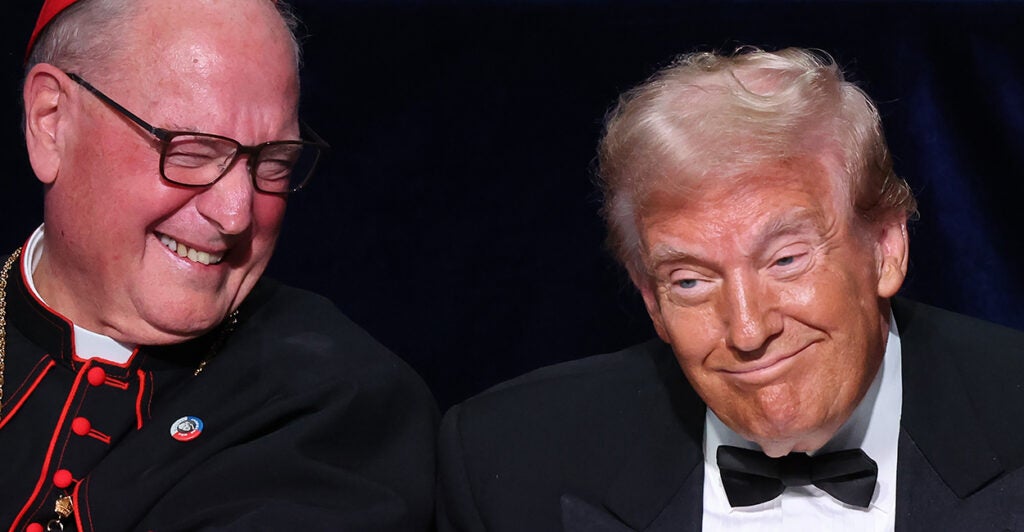Kamala Harris and company are all in with radical, anti-life policies that could unsettle swing voters who might describe themselves as “moderately pro-choice” but hardly pro-abortion.
The amorphous terminology built around the concept of personal autonomy has different meanings to different ears. In conversations with family members, friends, co-workers, and neighbors who are saturated with media reports designed to obscure the brutality of the abortion industry, practicing Catholics are at a perpetual disadvantage.
The upshot is that when questions involving God-given innocent, human life are phrased with precision and sufficient detail, more Americans are willing to step in and restrict unsavory procedures. That’s one major takeaway from recent polling on abortion policy.
Although it’s fair to say the pro-life movement has fumbled somewhat with state-level ballot measures and legislation that overreach public sentiment, the opposing side has offered practicing Catholics a potential gift in the form of Team Harris.
There’s an argument to be made that the Democratic Party’s 2024 presidential ticket is the most anti-Catholic in American history. But this argument must be made consistently and vociferously to pliable Catholic voters who aren’t exactly in love with Donald Trump.
Fortunately, Catholic voters who may not like Trump personally can recognize that it’s not just the sanctity of human life at stake, but also larger questions of religious freedom.
If Vice President Harris is elected president and Minnesota Gov. Tim Walz is elected vice president, Catholics will experience an onslaught against their faith, their families, and the constitutional freedoms like never before.
Moreover, the “culture of death” that was on display at the Democratic National Convention in Chicago, compliments of Planned Parenthood, will become deeply ingrained in public policy if Trump doesn’t regain the presidency.
But how can someone who has engaged in vulgar “locker room talk,” extramarital affairs with prostitutes, and crude language that religious-minded voters find unappetizing suddenly be viewed as their savior? A biblical view may be in order.
Some of the most unlikely figures in history with a checkered past have answered God’s call to deliver a greater good. Trump—who is clearly devoted to his family, his country, and the concept of American exceptionalism—holds up well against many on this list.
Before Saul of Tarsus became St. Paul the Apostle, he was a Roman citizen and a member of a religious party known as the Pharisees, who persecuted Christians. Saul was clearly complicit in violent acts, including the stoning of St. Stephen, a deacon in the early church who was the first to be martyred for his belief in Jesus Christ.
Saul was brutish. The man known as St. Paul who emerged after his conversion is now viewed as one of the most influential apostles because of his major contributions to the New Testament.
Catholics who have traditionally voted for Democrats, and remain registered as such, could be a decisive factor in swing states if they understand what’s at stake. Harris’ Democratic Party is many steps removed from the Democratic Party of President John F. Kennedy, which championed Catholics who sought elected office.
In fact, Harris is part of the Biden-Harris administration, which has explicitly targeted Catholics who attempted to exercise their free speech rights.
Under a President Harris, the Justice Department could be further weaponized against Catholics who don’t fall in line with her administration’s views on abortion, marriage, transgender activism, and parental autonomy in education, to name a few key issues.
Given her track record, it’s also evident that a President Harris would work to exclude Catholics from serving in government positions. Recall that during her almost four years as a U.S. senator from California, Harris openly attacked a judicial nominee for his membership in the Knights of Columbus.
Harris achieved a perfect score from Planned Parenthood during her time in the Senate. A score like that indicates that Harris would be willing to jeopardize human life at any stage of pregnancy.
Harris also introduced a Senate bill known as the “Do No Harm Act,” aimed at coercing Catholic doctors into performing abortions and transgender surgeries. If enacted, the bill could put religious charities, including Catholic schools and the Little Sisters of the Poor, out of business.
Harris didn’t stop there. She also has been an ardent supporter of the Equality Act, legislation that would impose sanctions on Catholics who defy gender ideology initiatives.
So, the Catholic case against Harris isn’t difficult to make. But can Catholics be sold on the idea that if Saul can become Paul, then perhaps Trump can become president again? Recent history says yes.
In 2016, polls showed Trump trailing Hillary Clinton, the Democratic nominee, by a significant margin. Clinton had picked Sen. Tim Kaine, D-Va., as her running mate. Although Kane was ostensibly Catholic, he also had a 100% rating from Planned Parenthood that didn’t go over well with Catholic voters when it was exposed.
Trump ended up winning the Catholic vote over Clinton. Fast forward to 2020 and capturing the Catholic vote was a taller order when the incumbent Trump was up against Joe Biden, the longtime U.S. senator from Delaware who served as Barack Obama’s vice president.
Despite consistently pushing policies at odds with the teachings of the Catholic Church to which he belongs, Biden benefited from congenial press coverage and COVID-19 pandemic measures that enabled him to avoid scrutiny on the campaign trail.
Even so, the Catholic vote in 2020 split about evenly between Biden and Trump. Before Biden dropped his reelection bid in July and endorsed Harris for the top of the ticket, polls showed he was trailing Trump among Catholics by a clear margin.
Catholics make up about 27% of the electorate. That’s not an insignificant number; if they vote as a bloc against anti-Catholic figures, they could provide the margin of victory in critical states.
If Catholic voters can be persuaded that Donald Trump in effect stands between them and the loss of religious liberty, they could make St. Paul proud.
